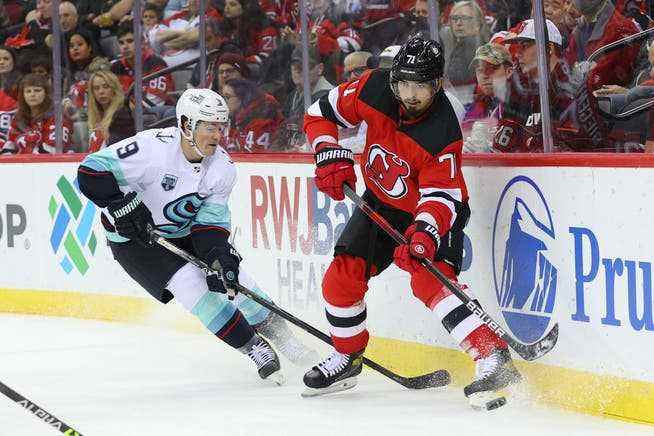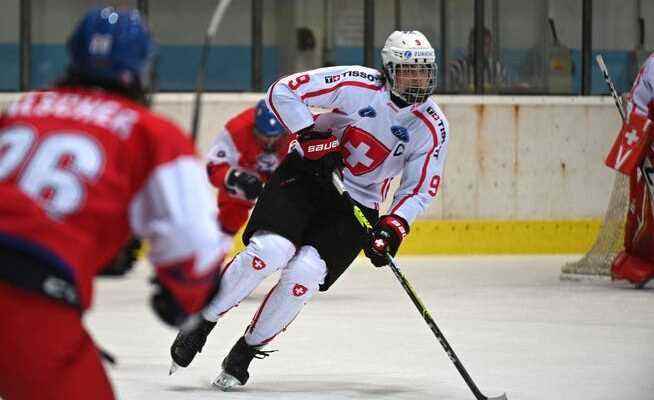The 2022 NHL Entry Draft begins Thursday in Montreal. With the 18-year-old defender Lian Bichsel, a Swiss player could be drawn in the first round for the first time in five years. the
Lian Bichsel as captain of the U-18 national team last August. The defender could become the first Swiss first-round draft since Nico Hischier.
It was a short but big piece of history that was written on June 23, 2017 in Chicago. Nico Hischier was the first Swiss ice hockey player to be drafted first in the NHL entry draft. The New Jersey Devils voted the Naters forward the best junior in the world. An event that the less sporty public in Switzerland also took notice of.
It was the culmination of a development that for almost ten years had only pointed in one direction: upwards. Swiss ice hockey had made remarkable strides in training, with seven players drawn in the first round from the generation born in the 1990s. Another three in the second.
All Swiss draft picks in the first and second rounds
- 1997: Michel Riesen (Edmonton, 1st round, 14th place). Forward, retired 2014, 12 NHL games, 1 scorer.
- 1999: Luca Cereda (Toronto, 1st round, 24th place). Forward, retired in 2007, no NHL game.
- 2002: Tobias Stephan (Dallas, 2nd round, 34th place). Goalie, active at Lausanne, 11 NHL games.
- 2003: Tim Ramholt (Calgary, 2nd round, 39th place). Defenseman, retired 2018, 1 NHL game.
- 2008: Luca Sbisa (Philadelphia, 1st round, 19th place). Fullback, retired 2021, 781 NHL games, 121 points.
- 2008: Roman Josi (Nashville, 2nd round, 38th place). Fullback, active at Nashville, 845 NHL games, 584 scorer points.
- 2010: Nino Niederreiter (New York Islanders, 1st round, 5th place). Forward, active, in contract negotiations, 814 NHL games, 398 scorer points.
- 2011: Sven Bärtschi (Calgary, 1st round, 13th place). Forward, active at Bern, 294 NHL games, 138 scorer points.
- 2013: Mirco Müller (San José, 1st round, 18th place). Defender, active at Lugano, 188 NHL games, 28 scorer points.
- 2014: Kevin Fiala (Nashville, 1st round, 11th place). Forward, active for Los Angeles, 454 NHL games, 298 scorer points.
- 2014: Noah Rod (San Jose, 2nd round, 53rd place). Forward, active at Geneva/Servette, no NHL game.
- 2015: Timo Meier (San José, 1st round, 9th place). Forward, active at San Jose, 429 NHL games, 284 scorer points.
- 2015: Jonas Siegenthaler (Washington, 2nd round, 57th place). Fullback, active for New Jersey, 186 NHL games, 27 points.
- 2017: Nico Hischier (New Jersey, 1st round, 1st place). Forward, active for New Jersey, 305 NHL games, 207 points.
- 2021: Janis Moser (Arizona, 2nd round, 60th place). Fullback, active at Arizona, 43 NHL games, 15 points scorer.
Five years later, those glorious draft nights seem far away. Kevin Fiala, Timo Meier and Nico Hischier have become stars of the scene. But the talent ejection has stalled. In autumn 2020, for the first time in 15 years, no Swiss were drawn at all.
The detour to Sweden has paid off
Lian Bichsel doesn’t have to be interested in any of that. The 18-year-old from Solothurn left his club, EHC Biel, for Sweden last summer because he believed he could develop better in the Leksand organization. The calculation worked: Bichsel played for long stretches in the first team in Sweden’s highest league.
And now the extremely tall and heavy defender (198 cm, 102 kg) at a young age has a chance of becoming the tenth Swiss first-round draft. Bichsel is not a new novel Josi. But complete, robust and defensively reliable. The majority of the experts see him somewhere between 16th and 48th place – i.e. in the second half of the first or the first half of the second round.
These are good prospects for the ice hockey training center in Switzerland. However, Lian Bichsel is now an exception that proves the rule. There is no other comparable talent in sight for the foreseeable future. And thus no return to the tradition of regular first-round drafts.
Lian Bichsel left EHC Biel to try his hand at Leksand.
It is a realization that contrasts with self-understanding. In the middle of the last decade, Swiss ice hockey was believed to have established itself as the first pursuer of the top 6 nations Canada, Sweden, Finland, Russia, USA and the Czech Republic. They enjoyed the recognition of the Germans and the Slovaks, who recently produced several top juniors. The defender Moritz Seider, for example, who was recently voted NHL rookie of the year.
The signs of stagnation have been evident for some time
The search for explanations almost inevitably leads to Thomas Roost. The Zurich native has been observing players from Switzerland and Germany for the NHL Central Scouting Bureau for a quarter of a century. He also states: “There are better and weaker vintages. But in the big picture there can be no doubt that the Swiss juniors have fallen back slightly in international comparison. »
In fact, the signs of stagnation have been evident for some time. At the U-18 level, the most important in the NHL talent show program, the Swiss have played an outsider role at the World Cup for years. In 2015, at the home world championships in Zug and Lucerne, they finished the tournament in 4th place. Every year since then, they’ve been far closer to relegation than to fighting for medals.
Roost sees the main reason for this in the basic training. His observation: “The younger the players, the greater the gap to their peers in the big nations.” This problem can be counteracted by better training the trainers at the lowest levels, who often do forced labor. “The association should send the most capable people to the clubs and encourage and instruct them.”
However, Roost does not want to practice fundamental criticism. The importance of ice hockey, the dual education system, the strong competitive spirit between the clubs: none of these parameters can be tweaked, or at least only a little. They make the popular comparisons with countries like Sweden or Finland superfluous.
It’s never too late to make progress
Instead, it is important to recognize the advantages. From the age of 16, the Swiss would make greater progress than the competition – and continue into adulthood. The high effort involved in combining school and sport makes development more difficult, but promotes resilience. “Our NHL players are considered to have above-average ability to learn. I have received this feedback many times.”

Has developed into a top defender in his fourth NHL season: 24-year-old Zurich native Jonas Siegenthaler (right).
The assessment can be supported with examples. Detroit forward Pius Suter made the leap from the ZSC Lions to the NHL at the age of 24. Janis Moser had proven himself for three seasons with Biel in the National League before Arizona drafted him in the second round last summer at the age of 21. And 24-year-old Jonas Siegenthaler has recently developed into a top defender with New Jersey.
In general, Thomas Roost gives good marks to both the clubs where the lion’s share of the work is done and youth national team programmes. In general, they are better positioned than, for example, Germany or Slovakia. Only one thing has always bothered him: “In our training, we focus more on eliminating weaknesses instead of promoting individual strengths.”
Markus Graf picks up this puck. The native of Bern has been head of training at the Swiss Ice Hockey Federation (SIHF) for 16 years. He says: “We have to strengthen our collective and at the same time promote individual talent in such a way that it makes the leap to the next performance level. The tip needs width – and vice versa.”
The statement clarifies the tension in which the SIHF finds itself. On the one hand, it must provide a sporting and organizational umbrella for its stakeholders, the competing clubs, and on the other hand, it must unite all interests under it. That requires a lot of diplomatic skill. It is logical that Graf often uses the adjective “political”.
However, obtaining the financial means will not be any easier in the future. The National League broke away from the association in the summer of 2020 and negotiated its new TV contract, which will start this season. A financial equalization between the league and the association is necessary for youngsters.
Graf is pragmatic: “You could always need more money for youngsters. We want to do the best with what we get.” There is no shortage of ideas and programmes, for years the clubs have been advised and financially supported through various certifications, so-called labels – also at the registration level.
A decentralized project called “Umbrella” clarifies the relations. It envisages that around ten regional instructors will look after the clubs in their region. The job profile is comprehensive, and training as a trainer is also part of it. The planned workload per instructor: 20 percent.
Ice hockey federalism hardly allows for big leaps
The example is symbolic of the small steps that have to be taken in Swiss ice hockey federalism. Larger leaps, such as the once-conceived rookie championship with eight selection teams from the regions, are still “politically” not feasible today, Graf had to realize.
Instead, the championships of the national top leagues U-20 and U-17 Elite are contested with 13 teams each – although their quality is openly criticized because the best juniors move abroad or are used in farm teams. In the future, the possibility of using four so-called overager players per team should raise the level.
Conversely, according to Markus Graf, it is not very effective to always see the glass half empty. “It suits our country that we are driven by competition.” Various organizations invest large sums in their youth work, and since 2020 EV Zug has had a superb infrastructure at its disposal with the OYM sports complex, which also opens up new horizons in the promotion of talent.
“We can still produce Hischiers, Fialas and Meiers, and we’re doing it more and more,” Markus Graf is convinced. This year Lian Bichsel could prove him right.
